GUILLOTINE
The most ubiquitous of all cutters today, the guillotine is a blade set in a frame with a hole for the cigar head to fit in; they produce a straight cut. The guillotine blade slices through the cigar head, removing just enough wrapper to allow the cigar to draw. A sharp blade is vital for a proper cut that will not pinch or tear the wrapper. In addition, proper technique is critical to ensuring the perfect cut.
Guillotine Technique: When using a guillotine cutter, it is important to put one hand as close to the head of the cigar as possible and apply a firm grip. This will keep the cap from shifting and ensure accuracy. It is also helpful to give the guillotine and/or cigar a slight twist as it enters the cigar, to avoid tearing or pinching.
|
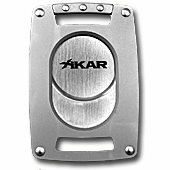 |
DOUBLE GUILLOTINE
The double guillotine has two blades set in a frame with a hole for the cigar head to fit in. This cutter has the advantage of approaching the cap from two sides, which can minimize the risk of tearing the wrapper. A sharp blade, a quality frame, and solid technique, are still necessary to produce The Perfect Cut. Contrary to popular belief, double guillotines are not self-sharpening, but they will stay sharp longer, since each blade is doing half the work. |
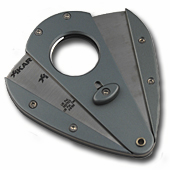 |
V CUTTER
The V cutter , also known as a "cats eye" or "wedge", is a relatively old-fashioned method which is very popular on machine made, pre-cut cigars. The V cut imprint digs deep into the filler of a cigar and chomps out a wedge of tobacco. It is unnecessarily invasive and poses a significant threat to the cigar head. The V cutter must be extremely sharp to work properly, and it must be deployed in a swift motion. Hand placement near the head of the cigar is necessary to avoid potential damage to the cigar. The V cutter is most effective on very slim cigars, such as panatelas and lonsdales. |
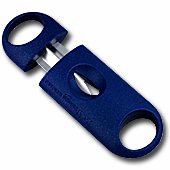 |
PUNCH
The punch [or plug] cutter is a modern day favorite of cigar lovers. The cylindrical blade provides a precise and consistent cut. When using a punch cutter, it is important to put one hand on the head and over the shoulders of the cigar and apply a firm grip. This will keep the cap from shifting or loosening. The cutter and/or cigar should be slightly twisted as the wrapper is pierced to avoid tearing. Punch cutters are available in varying diameters and in a multitude of styles: from keychains to self cleaning. The greatest asset of the punch cutter, barring user error, is that it is always consistent. |
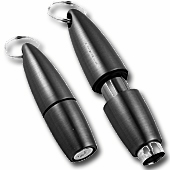 |
PIERCER
The piercer is one of the rarest techniques for opening the head of a cigar. Almost any pointy, sanitary instrument will do the job - including the back of a wooden match stick. The objective is to pierce the cigar cap one or more times so the cigar will draw. The drawback of using such a small opening is that tar, nicotine and moisture can accumulate at the openings and effect the flavor of the cigar. The benefit of the piercer is that it can be preferred by people who like to smoke their cigars more slowly and draw less smoke. In addition, some very enthusiastic smokers have been known to skewer their nub and use the piercer as a handle. |
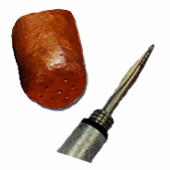 |
SCISSORS
The cigar scissor is an old fashioned and elegant approach to cutting a cigar. They are also one of the easiest and best types of cutters because they can be finessed easily while keeping the cigar and head visible. Cigar scissors are beveled and shaped to make a precise cut, so not just any scissor will do. Cigar scissors also come in a variety of shapes and sizes, but most scissors will accomodate larger ring gauge cigars. Again, the key to achieving a perfect cut is having a firm grip near the head of the cigar. |
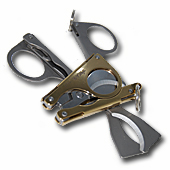 |
TEETH
When all else fails, there is no shame in using your teeth (or nails for that matter). With a little practice you can learn to cut a perfect hole in the cap with delicate strokes and nibbles. Our only caution with this method is to watch out for stray bits of tobacco which may stick to your teeth. Cigars like the one pictured here have a curly tip at the head (in lieu of a finished round cap) that can easily be bitten off. |
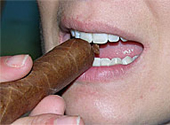 |
TOBACCONIST'S TIP:
Use a little soap and water to clean you cigar cutter blades. This will remove the tobacco and oil residues which will inhibit your cutting efficiency.
|
Certified R&D Tobacconists: United States |
|
|
|
|
|

